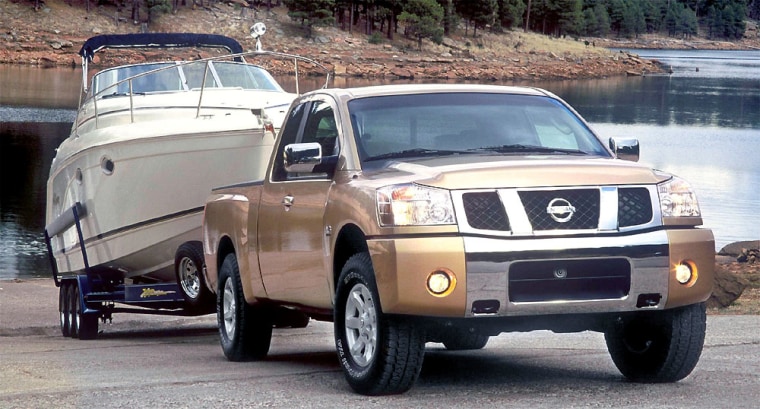Rising gas prices are causing some car buyers to take a second look at their purchase plans, but so far automakers are seeing no downturn in sales of trucks and sport-utility vehicles. Automakers led by General Motors, Ford and DaimlerChrysler reported Wednesday that U.S. vehicle sales rose last month over year-ago levels, with strong truck sales a supporting factor despite a surge of more than 10 percent in fuel prices.
A survey released Wednesday showed that 48 percent of prospective car buyers have either changed their mind about which model they plan to buy or are strongly considering a shift due to rising gas prices. That was up from 38 percent a month earlier, according to the survey from Harris Interactive and Kelly Blue Book.
But that shift, while notable, hardly means that millions of buyers will switch to subcompact models from SUVs, industry analysts said.
“Within segments, people are going to be more conscious of the mileage,” said Bob Schnorbus, chief economist for J.D. Power & Associates, which tracks automotive trends. “But at the same time dealers have so much leverage in terms of rebates and accessory packages, I think it’s going to be tough for the consumer to make a decision that’s purely based on fuel efficiency.”
U.S. gas prices for regular unleaded averaged $2.06 a gallon in late May when the survey of prospective car buyers was taken, according to the Department of Energy. That was up from $1.81 a month earlier and $1.49 in May 2003.
But Schnorbus said gas prices would have to rise much higher, and for a sustained period, before Americans would begin downgrading from the trucks and sport-utility vehicles they have grown to love in recent years.
The last time American consumers switched away from gas guzzlers for purely economic reasons was in the early 1980s, when gas was selling at about $3 a gallon in today’s inflation-adjusted terms, Schnorbus said. But wages have increased even faster than inflation over the past 25 years, so Schnorbus figures gas prices would have to rise to nearly $4 a gallon before car buyers would shift away from SUVs.
Carmakers are moving aggressively to protect one of their most lucrative markets. GM, for example, has raised cash rebates to $5,000 for some of its most popular sport utility vehicles, minivans and larger cars, up from $4,500 previously.
Sales of light trucks and SUVs now account for about 53 percent of all vehicle sales and tend to be more far more profitable than ordinary car sales.
At GM’s annual shareholders meeting Wednesday, chairman and chief executive Rick Wagoner said the company is not yet seeing any change in behavior caused by rising gas prices.
“If we ask (customers), ‘Are you changing your vehicle of choice at this point?’ the answer is no,” Wagoner said. “It’s our hope and frankly our expectation that gas prices should be leveling off and coming back down later in the year, but we’ll have to see how that goes.”
Robyn Eckard, a spokeswoman for Kelly Blue Book, suggested that if car buyers make any change in the near term to save money on fuel, it might be to choose a slightly more fuel-efficient SUV, perhaps a two-wheel drive version instead of a four-wheel drive.
Despite the sharp increase in gas prices last month, Ford sold nearly 15,000 Expeditions, its biggest model, up from about 12,000 in April, Eckard pointed out. Nissan sold about 3,000 of its Pathfinder Armada large SUV, up from 2,500 the month before.
Overall GM sales rose a steeper-than-expected 6.5 percent, buoyed by an 11 percent gain in truck sales. DaimlerChrysler’s Chrysler division said its May sales rose 5 percent, lifted by demand for the Chrysler 300, the company’s new flagship sedan. Ford, hurt by an aging vehicle lineup, said May sales fell 3.1 percent. Ford sales rose by an adjusted 1 percent after accounting for one fewer selling day in May this year and excluding its foreign brands Volvo, Jaguar and Land Rover.
Total U.S. vehicle sales for May came in at a seasonally adjusted annual rate of about 17.8 million units, much stronger than expected, said Paul Ballew, GM’s head of market and industry analysis. That was up from a disappointing 16.4 million rate in April and 16.3 million in May 2003.
“It was a good month, a very strong month for the industry,” Ballew told reporters and analysts on a conference call.
The Harris Interactive survey also showed an increase in the number of prospective car buyers considering a fuel-efficient hybrid model like the Toyota Prius or new Ford Escape hybrid – to 8 percent in May from 4 percent in April.
But Eckard and others noted that the higher prices of hybrid models mean that it would take five or six years of heavy urban driving to break even on saved fuel costs. But that could change if fuel prices rise higher and stay there.
The online survey was conducted among more than 1,700 adults who said they plan to buy a new vehicle within the next year.
Reuters contributed to this story.
